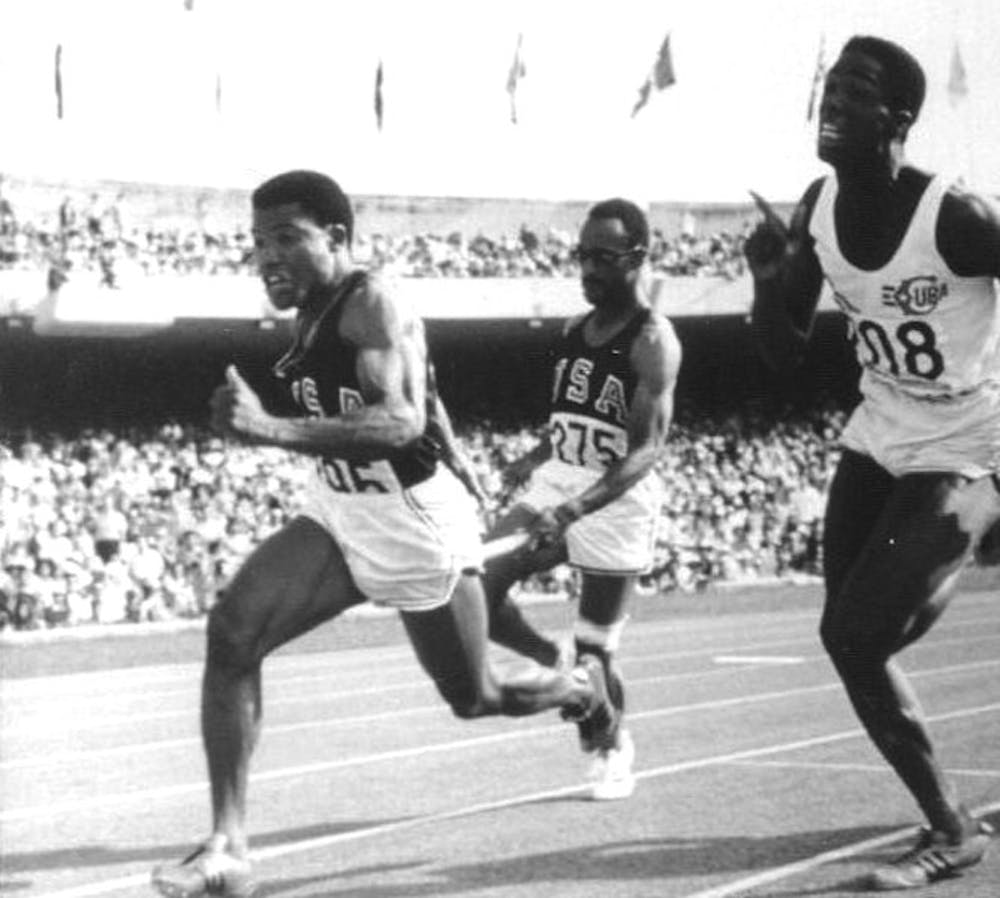Among the thousands of fans, athletes and judges at the Penn Relays this year, one man who has been a constant presence at the Penn Relays throughout the years will be missing.
Mel Pender has been to every Relays in recent memory, but a hip replacement and doctor’s orders are holding him back this year.
“This is the first time I’ve missed it, and it breaks my heart,” he said.
But his presence will not go unnoticed.
This year, Pender’s godson and Penn sophomore sprinter Kyle Webster will make his return to the Penn Relays after a debilitating leg injury and lengthy recovery.
And for Webster, he’ll be running for his family.
***
Pender didn’t have the typical start for a track athlete. He grew up disadvantaged before enlisting in the 82nd Airborne Division stationed in Okinawa and becoming a star football player on his division’s team. The elusiveness that Pender demonstrated in practice raised eyebrows.
SEE ALSO
From Princeton success to Penn progress for Dolan
‘Frosh sensation’ back on track after accident
But the thought of competing in track never crossed his mind until one day in 1963, when a Japanese team from Osaka traveled to Okinawa to compete against American athletes.
“I didn’t have any starting blocks … the gun went off, and I won,” Pender said. “It was my first track meet.”
Later that year, he became the interservice champion in the 100- and 200-meter dashes. As a reward, he went to Japan for rest and recuperation, and it was there where he considered the possibility of running in the 1964 Tokyo Olympics.
After re-enlisting with the 101st Airborne, he was sent to Korea where he attempted to join the Army track team after reading about them. Pender’s wish was granted, and he was sent to training camp with the 82nd Airborne division.
Although he struggled at first, he came back the next year with one of the top times in the world and reached Tokyo at age 27, where he finished sixth in the 100m after pulling an abdominal muscle.
He served in Vietnam — earning a bronze star — before spending a year training to make his second Olympic squad. At age 31 — a time when most sprinters have already retired — he placed sixth once again in the 100 meters at the 1968 Mexico City Olympics.
However, he would have his shining moment during the 4×100-meter relay, where his team took the gold medal and set a world record in the process.
“I ran the second leg,” Pender said, who ran alongside Charlie Greene, Jim Hines and Ronnie Ray Smith. “It was incredible because Charlie Greene got hurt in the first trials, and back then you couldn’t substitute. If you could run, you had to run.
“To win like we won, with Charlie hanging in there and set a world record, was the most rewarding of all gold medal[s] and the most incredible experience in my life.”
Charles Webster first met Pender at a track summer camp at West Point Military Academy at age 13. Webster, who came to the camp lukewarm to track at first, immediately found a role model in Pender.
“I had about six Olympians who came to the camp and he was so impressed with them, he was just around me a lot,” Pender recalled. “He used to watch me run at Madison Square Garden and the Penn Relays. I was like his mentor.”
But Pender was much more than a just a mentor to Charles, whose own father passed away when he was young. He was more like a father, guiding him along the challenges of life and helping him find his way back to school.
Even after Charles’ track career was derailed by hamstring injuries, it was Pender who provided a constant source of support. So much so, in fact, that Charles named Pender the godfather of all three of his children.
“He was a man that was doing things for young people that really made a difference in their lives,” Charles said. “It changed and altered people’s lives that what he was about. He was always giving back whether that means community, children or his job.”
If Kyle Webster learned anything from his father and Pender, it’s that humility and hard work will never disappoint.
“Uncle Mel has been a part of my life ever since I’ve run track,” Kyle said. “He’s taken me to numerous Olympic Games, exposed me to track — to have someone like that who was so involved in the track community and still involved to this day, it was a great role model to have.
“My parents have been nothing but supportive and have come out to every single track meet I have.”
After a promising high school career, Kyle was set to compete for Red and Blue until a leg injury caused him to miss his entire freshman season.
“People don’t know what that young man has gone through,” Charles said. “It will be such a moment of joy for our family.”
Kyle, with the help of hurdles coach Porscha Dobson and the rest of the coaching staff, has been integrated back into practice and is running well.
He set a personal best in the 110-meter hurdles and is ready to run the 4×100-meter relay this weekend, the same event in which his godfather won an Olympic Gold medal.
“It really hurts me in my heart not to see him run there … and I really wanted to be there,” Pender said. “But I’ll be there next year.”
SEE ALSO
From Princeton success to Penn progress for Dolan
‘Frosh sensation’ back on track after accident
Penn track and field gains momentum going into Relays
One more pre-Penn Relays meet for Red and Blue



